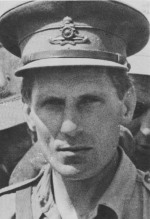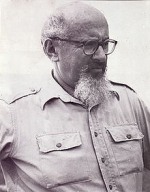Pages in Section 7

Wyngate's Night Squads
ii. The Irgun retaliate
iii. The Army takes over
iv. Tegart's Wall
v. Wingate's Night Squads
vi. Arabs capture Old City
vii. White Paper
viii. Assassination of Inspectors Ralph Cairns & Robert Barker
ix. 1939 Jewish Political Scene
 Captain Orde Wingate was an intelligence officer in the British Army, who had been brought up by strict Plymouth Brethren parents.* For Like many influential Plymouth Brethren in Palestine, such as Mr Clarke, director of Barclay's Bank and Mr Shelley, head of the Jerusalem Chamber of Commerce, Orde Wingate considered support for a Jewish State in Palestine a religious duty. Unlike Mr Shelley and Mr Clarke, however, Wingate actively disliked Arabs, once shouting at Haganah fighters after a June 1938 attack on a village on the border between Mandatory Palestine and Lebanon, "I think you are all totally ignorant in your Ramat Yochanan [the training base for the Haganah] since you do not even know the elementary use of bayonets when attacking dirty Arabs: how can you put your left foot in front?"
Captain Orde Wingate was an intelligence officer in the British Army, who had been brought up by strict Plymouth Brethren parents.* For Like many influential Plymouth Brethren in Palestine, such as Mr Clarke, director of Barclay's Bank and Mr Shelley, head of the Jerusalem Chamber of Commerce, Orde Wingate considered support for a Jewish State in Palestine a religious duty. Unlike Mr Shelley and Mr Clarke, however, Wingate actively disliked Arabs, once shouting at Haganah fighters after a June 1938 attack on a village on the border between Mandatory Palestine and Lebanon, "I think you are all totally ignorant in your Ramat Yochanan [the training base for the Haganah] since you do not even know the elementary use of bayonets when attacking dirty Arabs: how can you put your left foot in front?"
He befriended Haganah leaders and especially, Yitzhak Sadeh
(The picture to the left is of Orde Wingate.)
Yitzhak Sadeh was commander of the Jewish Settlement Police, who when the 1936 to 1939 Arab revolt in Palestine began, had established the Nodedet (Wandering Troop or Patrol Unit) in Jerusalem, that confronted the Arabs in their villages and bases. Wingate approved Sadeh's decision to found field companies known as FOSH ,as the commando arm of Haganah and of Sadeh's demand that his troops initiate military operations despite Haganah's long held policy of restraint in the face of Arab aggression. ( The picture to right is of Yitzhak Sadeh.)
Although by March 1938, the British Army had, effectively, destroyed all the Syrian guerrilla gangs in Palestine, Arab tactics had changed. Instead of waging guerrilla warfare against the British Army and the Palestine Police, rebels made terror attacks on civilian targets, murdering or kidnapping British, Jewish and Arab civilians, sabotaging police stations, roads and railways and making night-time attacks on rural Jewish settlements. They financed their activities by drug-smuggling, gun-running, and extorting money from Arab businesses.
British forces were badly over stretched, single platoons often defending villages against attacks by far larger rebel forces. General Officer commanding troops in Palestine, Sir Robert Hailing, told his superiors in London that the police had lost control of large parts of the country and he had cancelled all offensive military operations. The Arab population as a whole supported the rebels. Arab police were even stealing weapons from police stations.
These were the circumstances which enabled Wingate to persuade the British military that it support Sadeh's field companies although the High Commissioner was against it.
Wingate had already befriended Haganah leaders, especially, Yitzhak Sadeh, commander of the Jewish Settlement Police, who, when the 1936–1939 Arab revolt in Palestine began, had established the Nodedet ( Patrol Units) in Jerusalem, that had confronted the Arabs in their villages and bases. Wingate approved Sadeh's decision to found the FOSH (Field Companies,as the commando arm of the Haganah and his demand that Haganah allow his troops to initiate military operations despite Haganah's long held policy of fighting only in defence.)
In June 1938, British commander, General Haining, gave Wingate permission to create Special Night Squads, armed groups formed at first from British soldiers. Later he recruited Haganah members of the Notrim. As the Notrim were officially allowed to use weapons there was no problem there. The Jewish Agency helped pay salaries and other costs of the Haganah personnel that Wingate trained.
Wingate accompanied his men on their patrols. The units frequently ambushed Arab saboteurs who attacked oil pipelines of the Iraq Petroleum Company and raided border villages the attackers had used as bases. They imposing severe collective punishments on the village inhabitants that were criticized by Zionist leaders as well as Wingate's British superiors. His brutal tactics, however, proved effective in helping to quell the uprising, and Wingate was awarded the DSO.